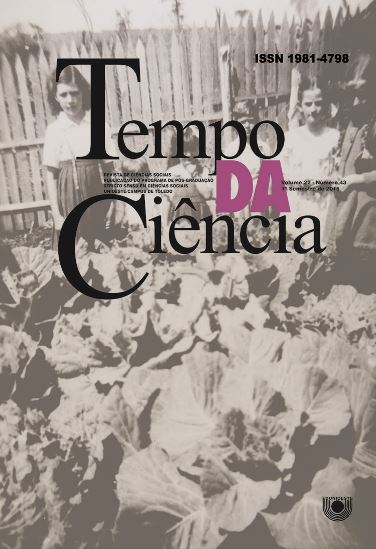O DESEMPENHO E AS COTAS: A METODOLOGIA DA TIM NO CASO DA UFSC
DOI:
https://doi.org/10.48075/rtc.v22i43.12642Palavras-chave:
Cotas, Ação Afirmativa, Política Pública, Desempenho Acadêmico.Resumo
O artigo trata de parte dos resultados da Dissertação elaborada para o Programa de Pós-Graduação em Sociologia Política (PPGSP) da Universidade Federal de Santa Catarina (UFSC). O texto conta com a análise através da metodologia da Taxa de Integralização Média (TIM), uma das metodologias a que a dissertação se propõe a avaliar o desempenho de acadêmicos cotistas na UFSC. Esta razão avalia o progresso do aluno na integralização dos créditos necessários para se formar. Será possível observar a comparação do desempenho acadêmico das diferentes formas de ingresso após a adoção do programa de ação afirmativa da UFSC em 2007 através de uma metodologia nunca antes avaliada em outra universidade. O texto, além de apresentar alguns resultados dessa metodologia aplicada à UFSC, também contextualiza a adoção da política de cotas nesta instituição. Outro interessante aspecto deste artigo é a divulgação de resultados auferidos diante da escolha metodológica similar a feita pelos pesquisadores da federal gaúcha (MONSMA et al, 2013). Trata-se da comparação entre aqueles avaliados entre os 20% de piores notas médias entre aqueles não ingressantes por cotas, com os cotistas (30% do total). A comparação entre estes indivíduos se justifica em alguns resultados preliminares, em que o valor da soma foi favorável aos cotistas, o que pode indicar um contraponto à tese de que os cotistas derrubariam o nível dos cursos. O gênero também é incluído na análise.Downloads
Publicado
Como Citar
Edição
Seção
Licença
Aviso de Direito Autoral Creative Commons
Política para Periódicos de Acesso Livre
Autores que publicam nesta revista concordam com os seguintes termos:
1. Autores mantém os direitos autorais e concedem à revista o direito de primeira publicação, com o trabalho simultaneamente licenciado sob a Licença Creative Commons Attribution que permite o compartilhamento do trabalho com reconhecimento da autoria e publicação inicial nesta revista.
2. Autores têm autorização para assumir contratos adicionais separadamente, para distribuição não-exclusiva da versão do trabalho publicada nesta revista (ex.: publicar em repositório institucional ou como capítulo de livro), com reconhecimento de autoria e publicação inicial nesta revista.
3. Autores têm permissão e são estimulados a publicar e distribuir seu trabalho online (ex.: em repositórios institucionais ou na sua página pessoal) a qualquer ponto antes ou durante o processo editorial, já que isso pode gerar alterações produtivas, bem como aumentar o impacto e a citação do trabalho publicado (Veja O Efeito do Acesso Livre).
Licença Creative Commons
Esta obra está licenciada com uma Licença Creative Commons Atribuição-NãoComercial-CompartilhaIgual 4.0 Internacional, o que permite compartilhar, copiar, distribuir, exibir, reproduzir, a totalidade ou partes desde que não tenha objetivo comercial e sejam citados os autores e a fonte.


